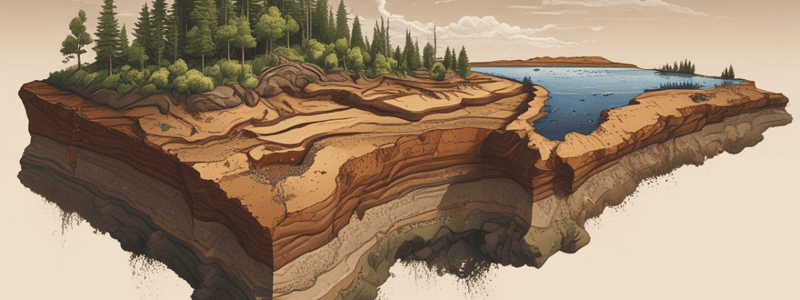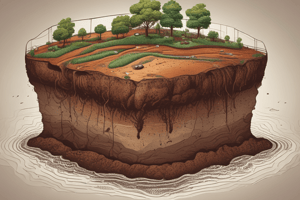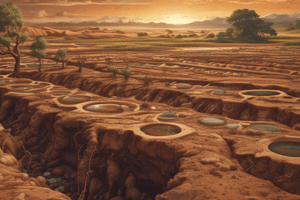Podcast
Questions and Answers
What is the term for the clustering together of soil particles to form larger structures?
What is the term for the clustering together of soil particles to form larger structures?
- Aggregates
- Floccules
- Flocculation (correct)
- Pedogenesis
What type of charges do soil particles typically have?
What type of charges do soil particles typically have?
- Negative (correct)
- Positive
- Neutral
- Variable
What is the purpose of cations in promoting flocculation?
What is the purpose of cations in promoting flocculation?
- They are repelled by the negative charge of soil particles
- They neutralize the charge of soil particles
- They are attracted to the negative charge of soil particles (correct)
- They increase the negative charge of soil particles
What is the benefit of humus in terms of cation exchange capacity?
What is the benefit of humus in terms of cation exchange capacity?
What is the result of a cation with a +2 charge replacing two separate cations each with a +1 charge?
What is the result of a cation with a +2 charge replacing two separate cations each with a +1 charge?
What happens to cations in the soil solution when plant roots absorb them?
What happens to cations in the soil solution when plant roots absorb them?
What is the term for the ability of the soil to adsorb cations onto its surface?
What is the term for the ability of the soil to adsorb cations onto its surface?
What type of particles have a higher Cation Exchange Capacity?
What type of particles have a higher Cation Exchange Capacity?
What is the effect of adding organic matter to a soil with poor CEC?
What is the effect of adding organic matter to a soil with poor CEC?
What is the optimal pH range for soil?
What is the optimal pH range for soil?
What is the effect of liming on soil pH?
What is the effect of liming on soil pH?
What is the main purpose of liming?
What is the main purpose of liming?
Flashcards are hidden until you start studying
Study Notes
Flocculation
- Flocculation is the clustering of soil particles to form larger structures called floccules, which improves soil structure.
- Cations such as Ca2+ and Mg2+ promote flocculation by being attracted to the negative charges on soil particles.
- Soil particles have a negative charge, with smaller particles having more negative charges.
- Cations are adsorbed to the surface of soil particles, and polarized water holds soil particles together, trapping larger sand and silt in a floccule structure.
- High humus content is more beneficial than high clay content because humus is more fertile, holds more water, has a higher Cation Exchange Capacity, encourages more earthworm activity, and has more negative charges, resulting in an increased rate of flocculation.
Cation Exchange
- Cation exchange is the ability of the soil to adsorb cations onto its surface and exchange them for other cations.
- Cations are attracted to the negative charge of clay/humus particles and are adsorbed on the surface.
- Cations can be released into soil water (soil solution) and be replaced by others, supplying minerals to plants.
- A cation with a +2 charge (Ca2+) can replace two separate cations each with +1 charge (H+).
- Cations are removed from soil solution by plant roots.
- Colloidal humus particles have three times higher cation exchange capacity than colloidal clay particles.
- Adding organic matter to a soil with poor CEC (like sand) will increase its CEC.
- Main cations involved in cation exchange are Ca2+, Mg2+, Al3+, H+, and K+.
- Note that nitrate (NO3-) cannot be held, and sandy soils have the lowest CEC.
Soil pH
- Soil pH is the acid-base scale, measuring the concentration of H+ ions in a solution.
- Acidic soils have a pH of 0-6, neutral soils have a pH of 7, and basic soils have a pH of 8-14.
- The concentration of acidic ions adsorbed onto the surface of the soil determines the acidity of the soil.
- Acidic ions include H+ and Al3+, while alkaline/basic ions include Ca2+ and Mg2+.
- Importance of Soil pH:
- Lime increases Ca cations available for exchange (H, K, Al).
- As pH increases, the amount of negative charges on soil colloids increases, leading to greater CEC.
- Liming reduces ‘acid leaching’.
Studying That Suits You
Use AI to generate personalized quizzes and flashcards to suit your learning preferences.




